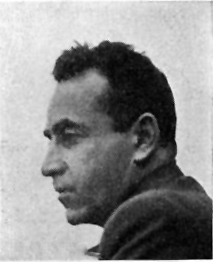Menashe Ravina was born in Pereyaslav, now part of Ukraine, to Elazar, a cantor and candy factory owner, and Brina. When he was two years old, his family relocated to Novogrudok, where his father took on the role of chief cantor, leading a synagogue choir. Ravina received his early education at heder schools, an elementary city school, and a pre-gymnasium in Baranovichi. In addition to his formal studies, he attended a yeshiva and trained in violin and piano. From a young age, he actively participated in his father's musical pursuits, serving as a choir conductor in the synagogue ensemble.
In 1917, Ravina began his studies at the Gymnasium and Conservatory in Yekaterinoslav (now Dnipro) and Grodno. By 1920, he had moved to Leipzig, where he studied piano and composition at the Leipzig Conservatory, earning the Mendelssohn Medal. During his time in Leipzig, he also taught Hebrew at the "Talmud Torah" school associated with the Carlebach Gymnasium.
Ravina immigrated to Palestine in 1924 and settled in Tel Aviv, where he became an influential figure in the cultural life of the Yishuv. He founded the "Institute for Music Dissemination," where he published numerous books, musical scores, and monographs. His scholarly contributions included comprehensive studies on Israel's national anthem, "Hatikvah," and the folk dances of Baruch Agadati.
During his early years in Israel, Ravina played in the orchestra of Mordechai Golinkin's Eretz-Israeli Opera and conducted several choirs, including the Tel Aviv Workers' Choir (1924–1935), the Hebrew University Choir in Jerusalem, and the "Oneg Shabbat" Choir at "Ohel Shem" in Tel Aviv, founded by the poet Haim Nahman Bialik. His efforts led to the first choir assemblies in Israel, which took place in 1925 in Ein Harod and Tel Yosef.
Between 1928 and 1933, Ravina traveled annually to Berlin, where he conducted synagogue choirs during the High Holy Days and studied conducting under Prof. Siegfried Ochs. He was actively engaged in the musical circles of Eastern European Jewish musicians, documenting and arranging Jewish folk music.
Ravina was a dedicated educator and taught at various institutions, including the "Shulamit" Conservatory, Herzliya Gymnasium, and the "Torat Levi'im" music school, which he also directed. Among his distinguished students was the composer Gil Aldema. He was renowned for his educational lectures on music, combining detailed explanations with piano demonstrations. His youth concerts with the Israel Philharmonic Orchestra captivated audiences and played a crucial role in fostering musical appreciation.
As a composer, Ravina contributed significantly to Israel's musical landscape. He composed for military ensembles such as the Palmah Choir and the Chizbatron, and his works became integral to national and educational celebrations. Notable among these are "Mi Yimalel" (Who Will Tell) and "Anu Banu Artza" (We Have Come to the Land), for which Ravina wrote the lyrics to folk melodies. Furthermore, he composed melodies for beloved children's songs, including "Eliezer Veha-Gezer" (Eliezer and the Carrot) with lyrics by Levin Kipnis, "Hashkediya Porahat" (The Almond Tree Blossoms) with lyrics by Israel Dushman, and "Bagina" (In the Garden) with lyrics by Haim Nahman Bialik. Ravina was awarded the Engel Prize in 1947 for his contributions to music research in Israel.
Ravina married Batya (née Shreyer), daughter of Azriel Shreyer, a prominent merchant and Zionist activist. They had two children: Dan Ravina, who became a professor of civil engineering at the Technion, and Ayala. He passed away in 1968 after a brief illness and was interred at Holon Cemetery. His lifelong commitment to music and education left an enduring mark on Israel's cultural heritage.
Sources: Wikipedia (Hebrew), Concise Encyclopedia of Jewish Music, Encyclopedia Judaica
A comprehensive list of his songs and compositions can be found on Zemereshet [here]






